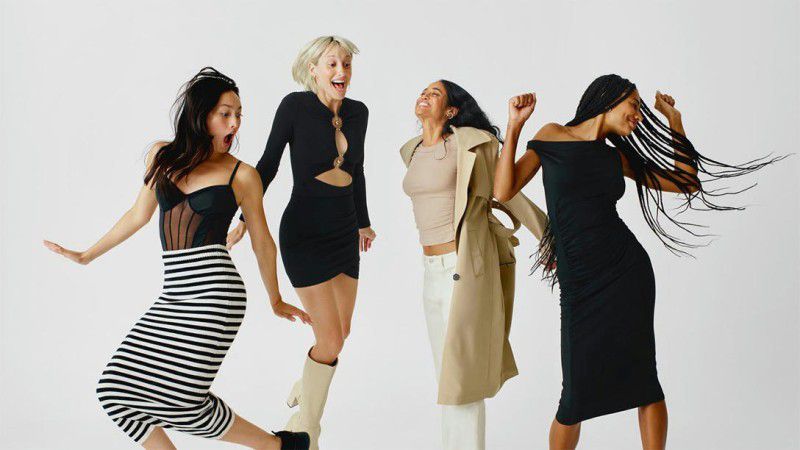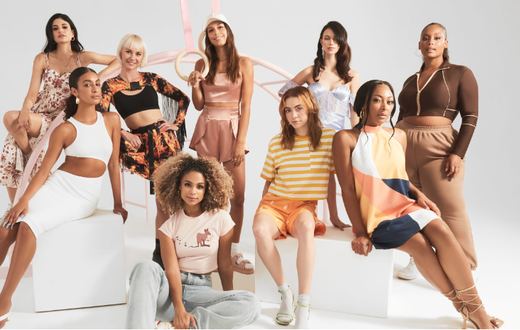The global fashion landscape is evolving rapidly, with more Nigerians and West Africans embracing bold, diverse, and inclusive styles. Gender fluidity has gained traction, making room for unisex designs and clothing lines that encourage self-expression regardless of gender identity. This inclusiveness is mirrored in the growing adoption of eco-friendly materials and transparent supply chain practices, as both consumers and brands acknowledge the urgent need for sustainability in the industry.
Revival trends such as the “Y2K” or early-2000s look, marked by vibrant colors, playful accessories, and nostalgic patterns, have also returned with force, especially among Gen Z and young millennials across Lagos, Accra, and other African cities. Minimalism—simple lines and muted tones—once dominated, but many are now opting for maximalist fashion, filled with statement pieces and eye-catching prints. This trend is clearly seen at Lagos Fashion Week and in street style from Lekki to Surulere, reflecting a renewed passion for creativity and individuality.
The merging of loungewear and athleisure has especially resonated with students and young professionals, offering comfort without sacrificing style. Soft joggers, oversized tees, and stylish sneakers are now visible from Nigerian university campuses to Ghanaian music festivals, as practical clothing blurs the lines between home and public life.
Major fashion brands have helped shape these movements locally and globally. Urban Outfitters and Free People are credited with the resurgence of “boho chic”—think floppy hats and flowy dresses. Meanwhile, labels like Forever 21 and H&M drove the global athleisure craze, which quickly found followers in African cities where comfort meets aspiration. For those who preferred understated silhouettes, Zara and Uniqlo set the bar with clean designs, inspiring a wave of minimalist boutiques in Nigeria’s urban hubs.
On the other end, streetwear’s growing popularity can be traced to brands such as Topshop and Supreme, whose influence is evident from Ikeja to East Legon. Festival fashion, with its eclectic flair, has thrived thanks to retailers like ASOS and Boohoo. But perhaps no brand has shaken up the scene quite like Shein, the Chinese online fast fashion retailer whose low prices and vast selection now command the attention of young people across Africa, outpacing more established fashion giants in the region.

Why SHEIN is taking over youth fashion: The latest craze explained
Shein’s meteoric rise in Nigeria and Ghana is due in large part to its targeted digital marketing strategy. The company harnesses the power of social media—Instagram, TikTok, and YouTube—to reach millions of potential buyers where they spend most of their time. Influencers play a vital role: viral “haul” videos and popular hashtags like #SheinHaul have brought Shein’s sprawling collections directly into the feeds of young Africans. Leading personalities such as Addison Rae have reportedly amplified this reach, making Shein a familiar name even in local WhatsApp groups and campus conversations.
According to Lagos-based digital marketing analyst Chika Okafor, “Shein’s strategy is about visibility and instant gratification. Young people see a style on TikTok today, and they can order it straight away at a price that fits their budget.” The speed and affordability resonate particularly well in nations where disposable income remains a challenge for many.
Inclusivity has become a distinguishing factor in Shein’s appeal. The retailer makes a deliberate effort to feature a wide range of sizes, including plus-sized and petite options, helping to break down long-standing barriers to fashionable dressing. “In Nigeria, where finding trend-forward pieces in my size used to be impossible, Shein finally changed the game for me,” shared Ifeoma, a university student in Enugu.
Furthermore, Shein’s collaborations with luxury labels have pushed the concept of “affordable luxury,” making designer-inspired looks accessible to youths from Lagos to Kumasi. These partnerships appeal to status-conscious shoppers who want to look chic without paying exorbitant prices.
Shein’s influence extends beyond what people wear. The brand’s presence has created unique job opportunities, especially in markets where traditional retail is less dominant. Digital-savvy Nigerians and Ghanaians are forging careers as personal shoppers, connecting local buyers to online deals, organizing Shein “group buys,” or providing curated shopping experiences in neighborhoods with spotty internet or import hurdles.
According to Ibadan-based stylist Timi Alade, “The rise of Shein has empowered enterprising youths, especially women, to start small logistics or fashion consulting businesses.” As online shopping becomes more familiar, these micro-enterprises are helping stimulate local economies and making trendy fashion even more accessible.

Why SHEIN is taking over youth fashion: The latest craze explained
Despite its soaring popularity, Shein faces serious scrutiny for its labor practices. Investigations by reputable outlets including Channel 4 and Wired have alleged that some Shein suppliers in China subject workers to unsafe conditions and excessive hours. These reports have spurred concerns across Africa, where consumers are increasingly conscious about the ethical sourcing of their purchases.
Local activists and fashion commentators like Amina Mohammed warn, “Supporting brands that overlook worker welfare is a step back for global progress.” In Nigeria’s bustling fashion community, heated debates have erupted online, with some shoppers choosing to boycott the retailer or demand action.
Environmental concerns add another layer of complexity to Shein’s rapid growth. The company’s large-scale, fast fashion model produces a substantial carbon footprint—reportedly comparable to some major coal-fueled power plants. While company statements note its emissions are just below United Nations reduction targets, industry experts stress that the fashion world must urgently adopt more sustainable practices to address climate change.
In West African communities, where waste management already presents significant challenges, the influx of disposable fashion raises questions about long-term ecological impact. “Nigerians love new clothes, but we must think about where these trends lead us in the future,” says Dr. Efe Ogbe, an environmental scientist based in Abuja. Local NGOs are calling for stricter regulation and more investment in upcycling, recycling, and sustainable design education.
As Shein’s grip on youth fashion tightens across Africa, it succeeds by offering affordability, inclusion, and convenience on an unprecedented scale. However, this growth is shadowed by significant ethical and environmental questions—issues Nigerians, Ghanaians, and the broader African community must confront in the quest for stylish, responsible, and sustainable consumption.
What’s your take on the fast fashion wave sweeping Nigeria and West Africa—does affordability outweigh concerns around ethics and environment, or should local consumers demand better? Drop your views below and join the discussion! Want more updates on trends that shape our world? Follow us and never miss out.
Have a story you want to share or sell? We’d love to hear from you! Email us at story@nowahalazone.com to get your story featured or discuss story sales.
Got a tip or opinion about youth fashion, ethical style, or business trends in Nigeria, Ghana, or Africa? Let us know—we welcome your insights!
Follow us on Facebook, X (Twitter), and Instagram for the latest stories, style inspiration, and more!










